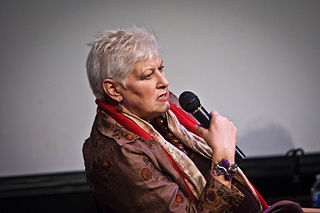A Quote by Stephen Marche
Almost all the voices in history have been men, but on this one question of gender, men don't talk about it. This has nothing to do with women; it has to do with men.
Related Quotes
Of course, if you photograph the behavior of women and men at a particular time in history, in a particular situation, you will capture differences. But the error lies in inferring that a snapshot is a lasting picture. What women and men do at a moment in time tells us nothing about what women and men are in some unvarying sense - or about what they can be.
I have a theory about American men -- I think they think women are boys who don't know how to throw a ball very well. American women are forced into the role of being men without penises, of being men who haven't quite been able to make it. If women don't want to be pussycats, then they get forced into the role of being almost as good as men. Which is lousy.
They wanted black women to conform to the gender norms set by white society. They wanted to be recognized as 'men,' as patriarchs, by other men, including white men. Yet they could not assume this position if black women were not willing to conform to prevailing sexist gender norms. Many black women who has endured white-supremacist patriarchal domination during slavery did not want to be dominated by black men after manumission.
It's a shame for women's history to be all about men--first boys, then other boys, then men men men. It reminds me of the way our school history textbooks were all about wars and elections, one war after another, with the dull periods of peace skimmed over whenever they occurred. (Our teachers deplored this and added extra units about social history and protest movements, but that was still the message of the books.)
I have always felt that perhaps women have sometimes almost embraced the same values as men, and the same character as men, because they are in the men's world, and they are trying to fit into a system that men have created. And maybe in truth when there is a critical mass of women who play that role in governments, then we will see whether women can really manage power in a way that is less destructive than the way that men have used power.
I really don't see any men sitting in the corner office plotting to keep women out. All the men I know are actively trying to promote women, to get more women involved. These men have wives they care about; they have daughters they desperately care about. So I don't think it's fair to blame men - or I don't think it's accurate to blame men anymore.
Men are enforced into a kind of silence about their gender; they're supposed to not think of it as a performance. That's the definition of manliness - that it's not a performance; it's being yourself, authentic. Whereas women have understood gender as performance. Men have not yet made that quantum leap, or rather they're making it in many ways, they're not thinking about it.
For men to focus on controlling women's reproduction to solve a society's problems seems nothing short of mad or, at best, superstitious. But men's superstition or insanity has real and dire consequences for the women who are its object. And states, too, home in on women's bodies, perhaps to create the illusion that men are in control of uncontrollable forces. Indeed, almost all governments try to control women's bodies and regulate their appearance in some way.
Feminism is a belief that although women and men are inherently of equal worth, most societies privilege men as a group. As a result, social movements are necessary to achieve political equality between women and men, with the understanding that gender always intersects with other social hierarchies.
A huge amount of what feminists are fighting for would have major positive impact for men as well as women. Take the male suicide rate, for example. In part, the problem arises from the idea that men are tough and manly, that 'boys don't cry' and it's embarrassing for them to talk about their feelings. So men are less likely to reach out for help and support with mental health issues. But that gender stereotype, which exists alongside the converse notion that women are over-emotional, 'hysterical', or 'hormonal', is one feminists are fighting hard to debunk.
Men create their own gods and thus have some slight understanding that they are self-fabricated. Women are much more susceptible, because they are completely oppressed by men; they take men at their word and believe in the gods that men have made up. The situation of women, their culture, makes them kneel more often before the gods that have been created by men than men themselves do, who know what they've done. To this extent, women will be more fanatical, whether it is for fascism or for totalitarianism.






































